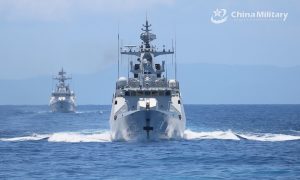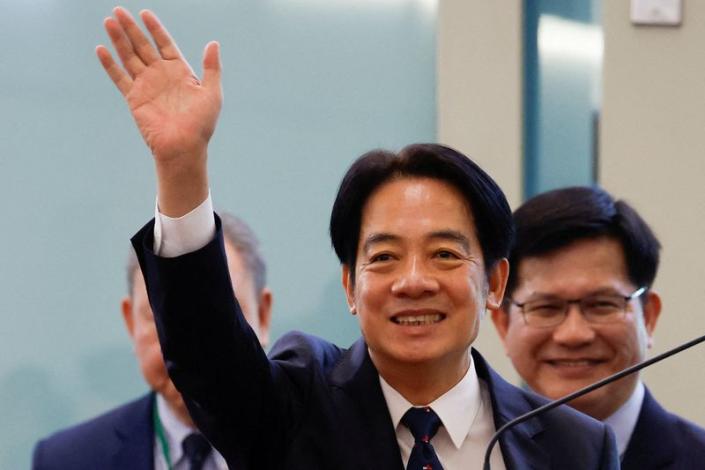China began military drills around Taiwan on Saturday, saying it was a “serious warning” to separatists who oppose Beijing’s goal to take control of the island.
The move – widely expected over a visit by Vice President William Lai to the United States – was condemned by Taipei.
Lai, the front-runner to become Taiwan’s president at elections in January, returned from the United States on Friday, where he officially made only stopovers on his way to and from Paraguay, though he gave speeches while in the country.
China views democratically governed Taiwan as its own territory, despite the strong objections of the island’s government.
ALSO SEE: Biden Keen to Upgrade US Partnership With Vietnam – Politico

Combat readiness patrols
The People’s Liberation Army’s Eastern Theatre Command, which has responsibility for the area around Taiwan, said in a brief statement it was carrying out joint naval and air combat readiness patrols around the island.
“This is a serious warning against Taiwan independence separatist forces colluding with external forces to provoke,” it said.
Taiwan’s defence ministry strongly condemned the drills, saying it will dispatch appropriate forces to respond and has the ability, determination, and confidence to ensure national security.
“The launch of the military exercise this time not only does not help peace and stability in the Taiwan Strait, but also highlights (China’s) militaristic mentality,” the ministry said in a statement.
Move aims to ‘scare voters before election’, Taipei says
The extent of Saturday’s manoeuvres was not immediately clear. Regional defence attaches and analysts were scrutinising the scale and intensity of the operations, seeking to gauge them against intensive Chinese war games in August 2022 and April this year.
China’s military fired missiles over Taiwan after the visit by former US Speaker Nancy Pelosi last year, and staged naval drills around the island in what Taiwanese officials described as preparations for a full invasion.
The drills in April, after President Tsai Ing-wen met House Speaker Kevin McCarthy on a stopover in California, were smaller but involved full combat exercises by China’s two aircraft carriers, some off the island’s Pacific coast.
Taiwanese officials had said China was likely to conduct military exercises this week near the island, using Lai’s US stopovers as a pretext to intimidate voters ahead of next year’s presidential election and make them “fear war”.
‘Independence supporter’ not popular in Beijing
China has a particular dislike of Lai for his previous comments that he was a “practical worker for Taiwan independence”. On the campaign trail, however, he has pledged to keep the status quo and repeatedly offered talks with Beijing.
Shortly before the military’s announcement, the Taiwan Work Office of China’s ruling Communist Party said Lai was “shamelessly” trying to “rely on the United States to seek independence”.
Lai has “stubbornly stuck to the Taiwan independence stance” and his US stopovers were “a disguise he used to sell out the interests of Taiwan in order to seek gains in the local election through dishonest moves”, it said.
Lai travelled to Paraguay for the inauguration of its president. The landlocked South American nation one of only 13 countries to maintain formal diplomatic ties with Taiwan.
Lai posted on Facebook pictures of himself in the capital Asuncion, chatting to US Interior Secretary Deb Haaland, as well as Spain’s King Felipe VI and Brazilian President Luiz Inacio Lula da Silva.
The United States, like most countries, has no formal ties with Taiwan but is its strongest international backer, bound by law to provide the island with the means to defend itself.
China has over the past three years ramped up military pressure on Taiwan, including sending military aircraft and warships near the island.
China fears he’ll set up a Republic of Taiwan
Lai has repeatedly said ahead of January’s election that he wants to keep the status quo with China, and offered to talk to Beijing.
“We don’t want to become enemies with China. We can become friends,” Lai told a Taiwanese television station this month.
But in China’s view, Lai is a separatist and “troublemaker through and through”, for comments he first made in 2017 as premier about being a “worker” for Taiwan’s independence, a red line for Beijing.
In 2018, as premier, he told parliament he was a “practical worker for Taiwan independence”, causing the widely-read Global Times, to call for China to issue an international arrest warrant for Lai and prosecute him under China’s 2005 Anti-Secession Law.
Lai said at the time and many times since he simply meant Taiwan is already an independent country, and on the campaign trail stuck by President Tsai Ing-wen’s line that the Republic of China, Taiwan’s formal name, and the People’s Republic of China are “not subordinate to each other”.
What worries Beijing is the idea that Lai could try to change the status quo by declaring the establishment of a Republic of Taiwan, which Lai has said he will not do.
“I think China hates him, really hates him,” said Wu Xinbo, an international relations professor at Shanghai’s Fudan University. “It is because if he is elected as the leader of Taiwan, he may come to advance his goal of Taiwan independence, which will provoke a crisis across the Taiwan Strait.”
Still, while China has announced sanctions on several senior Taiwanese officials, including Foreign Minister Joseph Wu, it has not done so for Lai, perhaps indicating Beijing does not want to totally shut the door to one day having talks with him.
“They are wary and maybe a bit distrustful of William Lai, but it doesn’t mean that Beijing cannot be pragmatic,” George Yin, a research fellow at National Taiwan University, said.
“Given that Beijing has become increasingly hawkish, I think the next Taiwanese presidency would very likely be characterised by a series of grey zone conflict and economic coercion. I think the intensity would go up,” Yin said.
Pledged to defend the island
Lai, during the election campaign, has been at pains to say he will stick to President Tsai’s path of proffering talks with China and maintaining peace and the status quo, while also pledging to defend the island and reiterating only its people can decide the island’s future.
Lai became vice president in 2020, standing as Tsai’s running mate where they won a landslide victory after warning of the threat to Taiwan from China given Beijing’s crackdown on anti-government protests in Hong Kong.
Since then, China has massively ramped up military drills. Beijing has rebuffed even the gentlest approaches by Lai.
In May, at a question and answer session with students at his alma mater, National Taiwan University, Lai said the head of state he would most like to have dinner with is Chinese President Xi Jinping, whom he would advise to “chill out a little”.
China’s Taiwan Affairs Office said his comments were “weird” and “deceitful” given that his “Taiwan independence nature” had not changed.
China has demanded Taiwan’s government accept that both sides of the Taiwan Strait belong to “one China,” something Tsai and Lai have refused to do.
“He appears even more resolute than Tsai Ing-wen on this,” said Meng Chih-cheng, a political science professor at Taiwan’s National Cheng Kung University.
- Reuters with additional editing by Jim Pollard
ALSO SEE:
China Upset Over ‘Dangerous’ US Weapons Package For Taiwan
Taiwan Asks EU to Deepen Ties if it Wants TSMC Chip Investments
Taiwan Invasion ‘Could Wipe Off up to $1 Trillion Per Year’
























